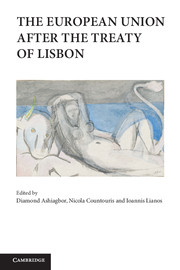Book contents
- Frontmatter
- Contents
- The European Union after the Treaty of Lisbon
- Introduction
- 1 The institutional development of the EU post-Lisbon
- 2 Competence after Lisbon
- 3 The Charter, the ECJ and national courts
- 4 Accession of the EU to the ECHR
- 5 EU citizenship after Lisbon
- 6 The law and politics of migration and asylum: The Lisbon Treaty and the EU
- 7 The European Union's common foreign and security policy after Lisbon
- 8 The European Ombudsman and good administration post-Lisbon
- 9 European contract law after Lisbon
- 10 Competition law in the European Union after the Treaty of Lisbon
- 11 The unexpected revision of the Lisbon Treaty and the establishment of a European stability mechanism
- Index
- References
10 - Competition law in the European Union after the Treaty of Lisbon
Published online by Cambridge University Press: 05 June 2012
- Frontmatter
- Contents
- The European Union after the Treaty of Lisbon
- Introduction
- 1 The institutional development of the EU post-Lisbon
- 2 Competence after Lisbon
- 3 The Charter, the ECJ and national courts
- 4 Accession of the EU to the ECHR
- 5 EU citizenship after Lisbon
- 6 The law and politics of migration and asylum: The Lisbon Treaty and the EU
- 7 The European Union's common foreign and security policy after Lisbon
- 8 The European Ombudsman and good administration post-Lisbon
- 9 European contract law after Lisbon
- 10 Competition law in the European Union after the Treaty of Lisbon
- 11 The unexpected revision of the Lisbon Treaty and the establishment of a European stability mechanism
- Index
- References
Summary
Introduction
The area of competition law has traditionally not been affected by the subsequent modifications of the Founding Treaties. The text of the Treaty of Rome's competition law provisions has stayed substantially the same, albeit with some minor terminological modifications. This seems to be a paradox, as EU competition law has incurred a profound transformation – from a substantive and institutional perspective – during the past twenty years. The most notable moments of this change have been the adoption of a Merger Regulation; the new decentralised approach in the enforcement of Articles 101 and 102 TFEU, following the adoption of Regulation 1/2003; and the turn towards a ‘more economic approach’, generated by the publication of a series of new Block exemption regulations and policy guidelines in all areas of competition law. The need for flexibility and quick adjustment to the rapid evolution of the economy and the emergence of a variety of business practices renders the instrument of the Treaty, because of its slow negotiation and ratification process, rather ill-suited for reforming the substance and procedure of competition law. The Commission has thus been offered an important discretion, sometimes exercised jointly with the Council, to frame the appropriate competition law framework that would correspond to the demand of times. The Treaty of Lisbon is not an exception: At first sight, the area of competition law has not been affected by a significant number of changes. Some of the changes brought are minor and essentially cosmetic (II). Nevertheless, some others have the potential to become transformative for competition law in the EU (III).
Cosmetic and minor changes
The Treaty of Lisbon proceeds to the renumbering of the provisions of the Treaty on competition law. The following conversion table indicates the major changes of interest for competition lawyers (Table 10.1).
- Type
- Chapter
- Information
- The European Union after the Treaty of Lisbon , pp. 252 - 283Publisher: Cambridge University PressPrint publication year: 2012
References
- 3
- Cited by

